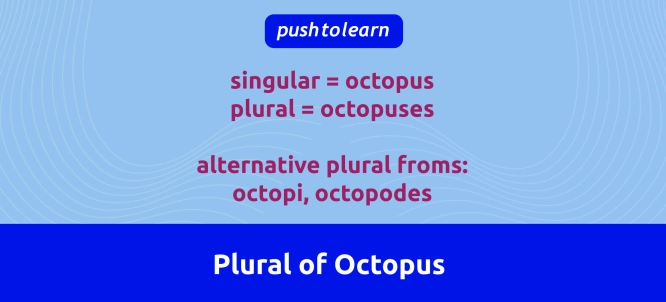by PushtoLearn
Plural of Octopus
Table of Contents
Confusing Plural Forms - Exercise and Quiz
1. Octopuses
This is the most commonly used and widely accepted form in English, following the regular rule of adding "-es" to words ending in "-us".
-
Origin: Standard English pluralization.
-
Example: "I saw three octopuses at the aquarium."
-
Usage Tip: Use "octopuses" in everyday English; it’s correct and easily understood.

2. Octopi
Some people use "octopi" because they believe "octopus" follows the Latin rule, where words ending in "-us" become "-i" in the plural (like "cactus" to "cacti"). However, "octopus" is originally a Greek word, so this pluralization is technically incorrect, although it’s still commonly used.
-
Origin: Latin-inspired pluralization (incorrect for Greek words).
-
Example: "The aquarium had several octopi on display."
-
Usage Tip: "Octopi" is acceptable in informal contexts, but some people avoid it due to its Latin origin.
3. Octopodes
This is the least common form and follows the original Greek pluralization. In Greek, words ending in "-pus" (meaning "foot") become "-podes" in the plural. It’s often seen in academic or scientific writing.
-
Origin: Greek pluralization.
-
Example: "The researchers studied octopodes in their natural habitat."
-
Usage Tip: "Octopodes" is rarely used in everyday English and mostly appears in academic or formal contexts.
Which Plural Should You Use?
|
Plural Form |
When to Use |
Recommendation |
|
Octopuses |
Everyday English, both spoken and written |
Most widely accepted and clear form |
|
Octopi |
Informal contexts, though less accurate |
Commonly used but not linguistically precise |
|
Octopodes |
Scientific or academic writing |
Rarely used outside formal contexts |
For general English usage, "octopuses" is the best choice. It’s correct, widely recognized, and easily understood.
FAQ
What is the most common plural form of "octopus"?
The most common plural form is "octopuses".
Is "octopi" correct?
"Octopi" is widely used but technically incorrect since "octopus" is a Greek word, not Latin.
When would I use "octopodes"?
"Octopodes" is mostly used in scientific or academic contexts.
Which plural form is preferred in everyday English?
"Octopuses" is preferred in everyday English as it’s correct and widely understood.
Why are there three plural forms of "octopus"?
The different forms come from different language rules: English ("octopuses"), Latin-inspired ("octopi"), and Greek ("octopodes").

